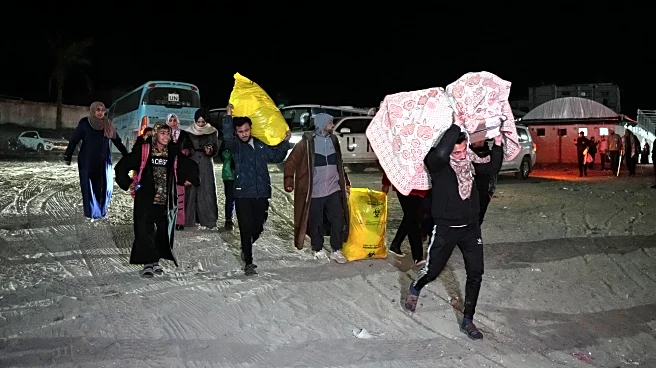What is the story about?
What's Happening?
President Trump has introduced a 21-point peace plan aimed at releasing hostages held by Hamas in Gaza. The plan suggests a comprehensive deal to free all hostages within 72 hours, coinciding with a cease-fire. However, Israeli officials express concerns over the plan's lack of explicit agreement from Hamas to exit Gaza and dismantle its weapons. Prime Minister Netanyahu faces a decision to either reject the plan due to its perceived insufficiencies or accept it to secure the hostages' release, with the risk of continued conflict if Hamas remains armed. Additionally, there is apprehension in Israel regarding the potential shutdown of the U.S. aid fund to Gaza, which could be transferred to U.N. agencies, a move opposed by Jerusalem due to past issues with aid looting by Hamas.
Why It's Important?
The proposed plan by President Trump holds significant implications for the ongoing conflict in Gaza and the broader Middle East peace efforts. If successful, the plan could lead to the release of hostages and potentially de-escalate tensions in the region. However, the lack of a clear commitment from Hamas to disarm raises concerns about the plan's effectiveness and the possibility of continued hostilities. The decision to potentially shift U.S. aid distribution to U.N. agencies could impact humanitarian efforts in Gaza, affecting both local populations and international relations. The plan's reception and implementation could influence U.S.-Israel relations and the geopolitical dynamics in the Middle East.
What's Next?
Prime Minister Netanyahu is expected to discuss the plan with President Trump at the White House. The outcome of these discussions will likely determine the next steps in the hostage negotiations and the broader conflict resolution efforts. Israeli officials are closely monitoring Hamas' response to the plan, which will be crucial in deciding whether to proceed with the proposed cease-fire and hostage release. The internal political dynamics in Israel, including pressure from coalition members and opposition leaders, will also play a role in shaping the government's approach to the plan.
Beyond the Headlines
The plan's implications extend beyond immediate conflict resolution, potentially affecting long-term peace efforts and regional stability. The handling of U.S. aid and its distribution could set precedents for future humanitarian interventions in conflict zones. The political maneuvering within Israel, including the positions of various government and opposition figures, highlights the complex interplay of domestic and international politics in shaping policy decisions.














